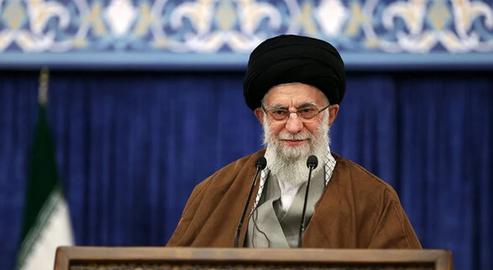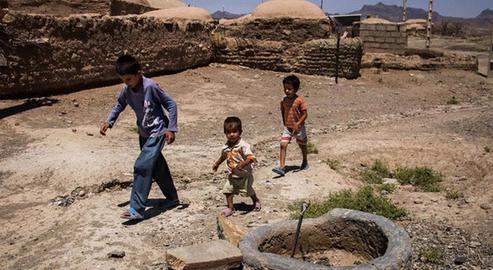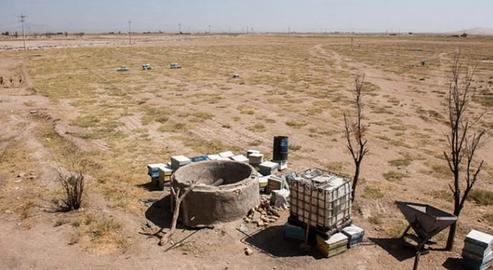"Today, these issues of the climate crisis, the water crisis, the energy crisis, global warming crisis, are raised as the principal issues of humanity. But they are not. The main problems of humanity are spirituality and morality; issues of men and women, the status of women, the dignity of women in society. These are the real crisis."
Ali Khamenei, May 22, 2011
A storm is battering Iran. The state of the economy, and wider Iranian society, today is a natural product of what has been done to this land for the past 40 years. The gardener of this blasted landscape is Ayatollah Ali Khamenei, the Supreme Leader of the Islamic Republic. For the past 32 years, he has run the country’s affairs solely based on ideology and conspiracy theories, to the point that Iran is now, without exaggeration, at a standstill.
Almost all of Iran's economic, political, social and, of course, environmental riches are being lost to the Islamic Republic. The structures are worn out, and there is no plan to replace them: not in the short term, nor the medium, or in some cases even the long. The water crisis engulfing Khuzestan – and lest we forget, other parts of Iran, too – is a classic example.
Khamenei has been the architect of Iran’s global isolation for the past 32 years. At times, he has proved himself to be the sole obstacle to Iran becoming a normal country. Like others, Iran is perfectly capable of meeting its needs and advancing forth in a sustainable and honest way, without trickery or adventurism. It well-equipped to interact with the world, to contribute to global expertise and engage in an honest give and take, based on mutual necessity. Traders stand ready to export their saffron and pistachios, and import wheat, corn and watermelon.
But this simple formula will not do in Iran under the Islamic Republic, because Ali Khamenei is much more interested in cheating and misadventure. This strategy has cost Iran dear, through sanctions, but also through the plundering of Iranian social capital – and the waters of its rivers.
Iran is not the only country struggling with water stress and the impact of climate change. But it is among those in the direst straits. The results of official attempts at “crisis management” are barely discernible, even amid the complete destruction of one-fifth of Iran’s fertile plains and the shrinkage of some vital bodies of water to less than half their pre-1979 size. And yet, the state still insists on a self-sufficient “resistance economy”.
What Does Khamenei Know About the Water Crisis?
In Ali Khamenei’s world, there is either no such thing as a "water crisis" or if there is one, it doesn’t matter much. Except for on that one occasion cited above, he has never mentioned it. And that single instance came during a speech to Iran’s so-called "elite women", 10 years ago, only so as to make the point that women’s “dignity” was more important.
In 20 recorded mentions of the word "environment" published online by the Office for the Preservation and Publication of the Works of the Leader of the Islamic Republic, none were in relation to the water crisis. Most instead contained such insights as: "The environment is a vital issue", and "Trees and plants are essential for breathing".
At one point, though, Khamenei did hazard a referral to soil erosion, stating: "The issue of [soil erosion] is more important than the issue of water." The fact that a decisive factor in soil erosion and subsidence appeared to escape him.
For 40 years, water has been extracted from underground aquifers in Iran many times faster than it can be naturally replenished, and used to grow water-intensive products like wheat and watermelon. Khamenei does not know that when the aquifers are spent, the life of the plains ends forever. When the water runs out, the empty space between the layers of soil disappears too, and so the soil compresses and settles. The plain subsides – in effect, it dies.
When a plain dies, there is no way back. Even if it goes on to rain for a hundred years, there is no longer an aquifer to be irrigated. Water remains on the surface and evaporates. Twenty percent of Iran’s plains have already met this fate.
The Resistance Economy vs Water!
The Iranian people are now grappling with some of the greatest crises in our contemporary history. But Khamenei's words remain the same. For about a decade now, those words have been: “resistance economy".
This derivative term was coined by the office of the Supreme Leader of the Islamic Republic to symbolize domestic alternatives to sanctioned activities. The idea is that Iran could manage all by itself and produce everything it needs internally.
Iran's population has more than doubled in the last 40 years. According to official statistics, cultivated land has expanded fivefold and the level of farm production quadrupled between 1977 and 2019. But even after this extreme agricultural development, Iran still needs to import about 44 percent of its food.
The imagined “resistant” scenario is impervious to such trifles as corruption, a lack of economic viability, slowed development, the wanton waste of natural resources, the death of plains, and the water crisis. The only important thing is to break from dependency. Along with quite a few other things, the Supreme Leader still has yet to learn that we live in an interconnected world.
Related coverage:
In Pictures: Khuzestan's Vanishing Waterways
Iranian Filmmakers, Writers and Teachers' Groups Back Khuzestan Protesters
Solidarity With Khuzestan Water Protests Spills Into Other Iranian Provinces
In Pictures: Khuzestan's Vanishing Waterways
Iranians Rally in Support on Fifth Night of Khuzestan Water Protests
Furious Crowds Protest Water Crisis in Khuzestan
Decades of Bribery and Mismanagement Lead to Khuzestan’s Protests
Desertification in Iran: A Ticking Time Bomb?
Iran's Water Crisis: In 20 Years Drought Could Make Some Iranian Cities Uninhabitable
Iranian and US Researchers Collaborate on Lake Urmia Restoration Study
Water Tariffs to Increase in Iran Ahead of Summer Shortages
250 Iranian Cities Face Summer Water Shortages
visit the accountability section
In this section of Iran Wire, you can contact the officials and launch your campaign for various problems



























comments